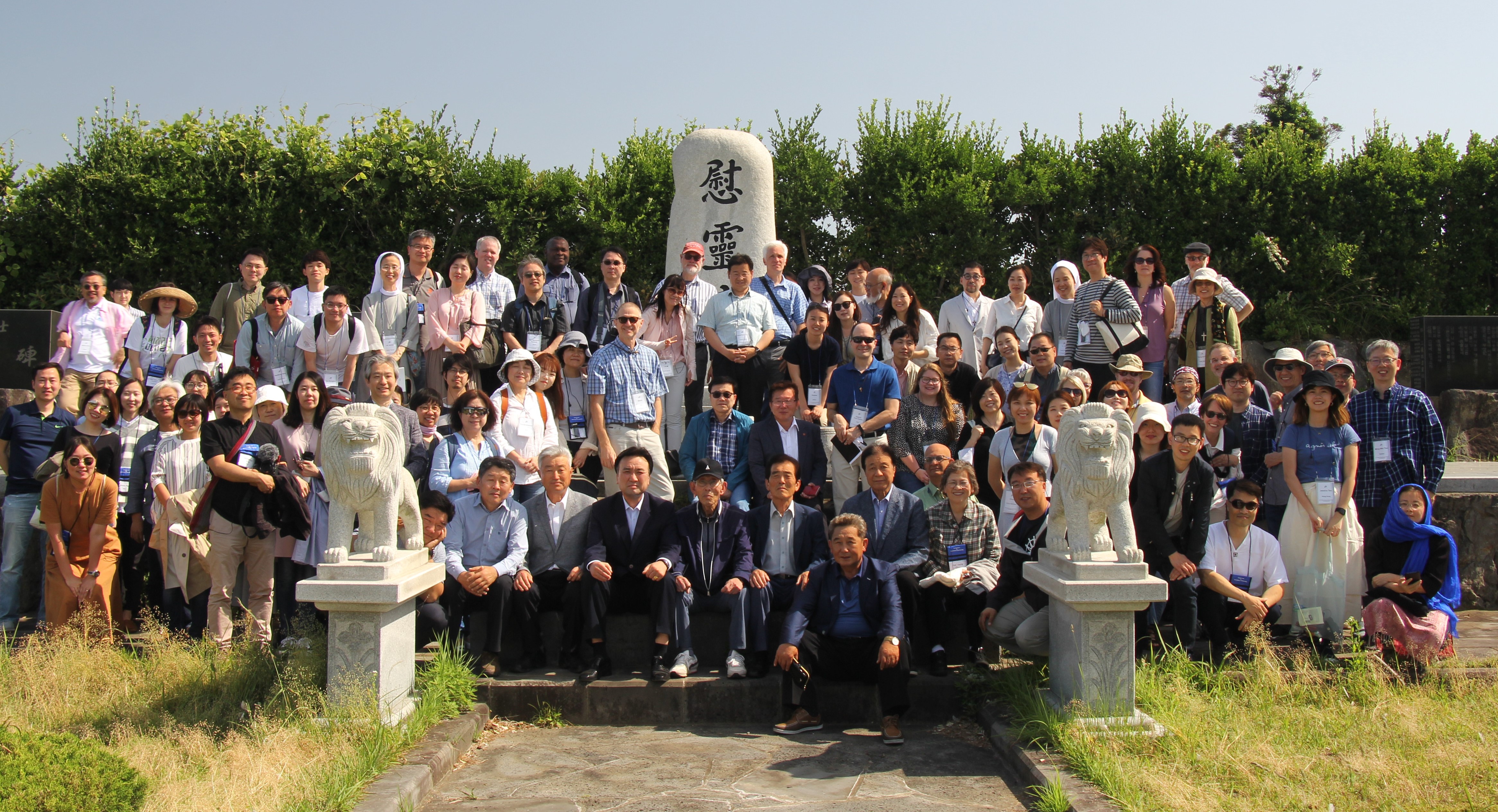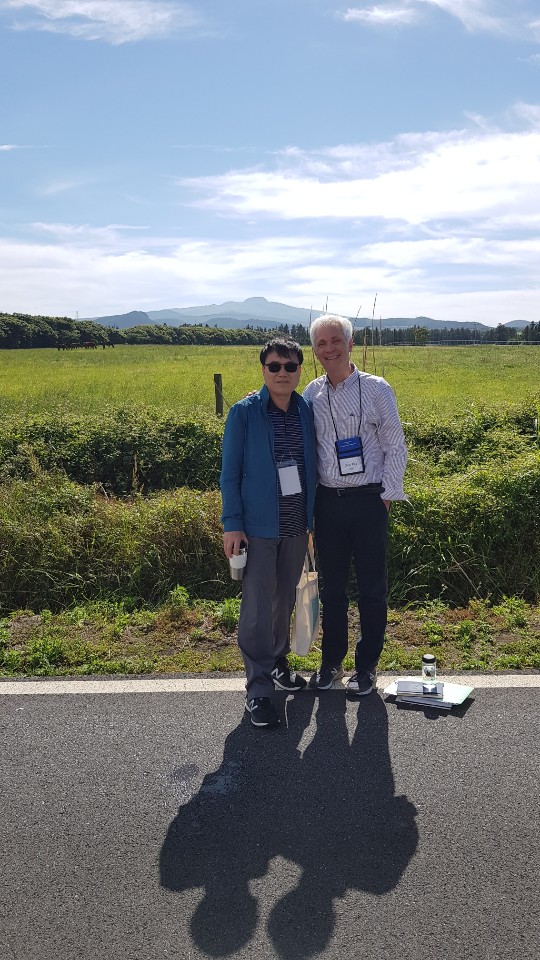A Letter from Choon and Yen Hee Lim, with Choon serving as Regional Liaison for East Asia, based in South Korea
August 2018
Write to Choon Lim
Write to Yen Hee Lim
Individuals: Give to E200491 for Choon and Yen Hee Lim’s sending and support
Congregations: Give to D506665 for Choon and Yen Hee Lim’s sending and support
Churches are asked to send donations through your congregation’s normal receiving site (this is usually your presbytery)
Dear Friends in Mission,
Growing up in Korea, I never heard the story of Jeju, a beautiful island located in the southern part of South Korea. It is well known for its beautiful beaches and mountains and is one of the favorite holiday destinations in South Korea. However, not many people are aware of the April 3rd Uprising and Massacre that occurred 70 years ago between March 1, 1947 and September 21, 1954 on Jeju Island. (April 3rd refers to a major disturbance that happened on April 3, 1948.) It was a chaotic period right after Korea gained independence from Japan. At this time, the Korean peninsula was entering the Cold War era. Some people, including the first president of South Korea and the U.S. government, wanted to establish a separate government in South Korea, while others wanted to establish a unified country with the North. Jeju islanders courageously stood up against the division of the Korean peninsula and strongly protested the first election that formed the Republic of Korea in the South in 1948. Unfortunately, military and police officers severely cracked down on Jeju islanders.
Approximately 30,000 people (10% of Jeju’s total population) lost their lives during this period. This story of brutality, oppression and death was hidden for decades.
Though I grew up in South Korea, I only learned of the story of Jeju Island when I attended the 6th Annual Christian Forum for Reconciliation in Northeast Asia at Isidore Retreat Center on Jeju Island in May 2019. My friend and colleague, Dr. Chris Rice — a former PC(USA) missionary kid who grew up in South Korea 50 years ago — now leads the forum. I participated in the forum with 95 leaders for reconciliation in Northeast Asia. These scholars, pastors, church leaders and young adults came from Mainland China, Hong Kong, Japan, South Korea, Taiwan, Canada and the U. S. On one of the forum’s six days, we embarked on a day-long pilgrimage to Jeju and heard the “Uprising and Massacre” story of pain and violence.
A New York Times article published in May 2019 provides an overview of the atrocity:
“After World War II, Korea was divided between an American-backed government in the South and a Soviet-backed one in the North. Starting in the spring of 1947, a group of Jeju islanders rose up against police brutality and called for a unified Korean government. The police and soldiers, joined by a right-wing paramilitary group from the mainland, responded with an extermination campaign, branding the insurgents as Communist agitators. The rebels fought back, raiding police stations, but vastly outnumbered and outgunned, the peasant army was eventually crushed. The 1948 U.S. military occupation of Korea supported plans for the systematic killing of what was named as a ‘Red Island’ population that needed to be violently suppressed, regardless of who was killed.” You may read the New York Times story at nytimes.com/2019/05/28/world/asia/south-korea-jeju-massacres.htmlAt the forum, a descendent of massacre victims explained, “the first audience we try to spread the story to is Americans.” A Korean group went to the U.N. in New York this past May to tell the story in hopes of ultimately gaining acknowledgement from the U.S. government. This painful story begs for public truth and reconciliation.
Though some still label the island’s protests as “riots,” today there is hope on the Korean peninsula. As the above-mentioned New York Times article explains, “in 2006, the South Korea government apologized for the indiscriminate butchering of innocent islanders in the name of fighting communism. In 2008, the government opened a large Jeju ‘Peace Park’ honoring the victims … The present government [of Moon Jae-in] acknowledges South Korea’s culpability [in] victims’ families liv[ing] with the stigma of being blacklisted as ‘reds’ in the decades following the Korean War under the guilt-by-association system and a pervasive system of political surveillance that kept people from talking about the horrors they witnessed.”
The most touching time for me in this forum was our pilgrimage day to the site of Hagwi village. The Hagwi village leaders took a 10-year journey to seek healing between the victims and perpetrators from all sides. During the 10-year journey, a memorial was established to all victims of violence regardless of whether they were on the “right” or “left” They are the true heroes of peace — their powerful story of hope ignited our collective imagination. One might compare it to the National Association for the Advancement of Colored People (NAACP) establishing a common memorial in Mississippi.
This forum may seem like a small thing, but whenever we work together, it is a sign of the Kingdom being near and on its way into our midst. Deeper presence and the participation of younger people were major highlights of this year’s forum. Ten years from now, their hard work for peace and reconciliation will bear fruit on the Korean peninsula and throughout the world.
We thank you for praying for and making financial donations to our ministry. With your continued support, you walk with us in the footsteps of the Hagwi village peacemakers.
Thank you!
Yen Hee and Choon Lim
![]() You may freely reuse and distribute this article in its entirety for non-commercial purposes in any medium. Please include author attribution, photography credits, and a link to the original article. This work is licensed under a Creative Commons Attribution-NonCommercial-NoDeratives 4.0 International License.
You may freely reuse and distribute this article in its entirety for non-commercial purposes in any medium. Please include author attribution, photography credits, and a link to the original article. This work is licensed under a Creative Commons Attribution-NonCommercial-NoDeratives 4.0 International License.

